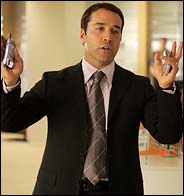« Marketing and CS: Your staff must "buy into" them. | Main
November 10, 2008
Curse of the big law firm: "An aggregation of narrow views"?

Boom! Morrison nails it. Elefant names it.
Via Legal Blog Watch, and the alert eye of Ed. of Blawg Review, I read Rees Morrison's comprehensive and perceptive piece in the New York Law Journal about what larger law firms can and cannot do for clients.
My take: Despite being a shareholder in an aggressive and varied boutique that works all over the U.S. and abroad in some unique ways, I like "larger firms" more than I like smaller ones. I am a product of one, and in my own firm prefer senior lawyers who made partners in one as my colleagues, and associates who can work at one (but have advisedly chosen not to) as associates. In fact, I strongly prefer "larger" firms--Morrison uses 1000 lawyers as a number but let's use 500 or more lawyers here--even while many larger firms don't get, and will never get, the client service cultures they will need to survive. But I do like their energy, combativeness, spirit and moxie, when those features are present.
(By the way, small and medium-sized firms often make noises that their size somehow naturally ensures a greater "client service" focus in their performance. Well, this is a huge, if entertaining, crock. Smaller firms as a group are way less CS-savvy than larger firms because, unlike their bigger brethren, they have never really thought about, studied, implemented or "enforced" CS regimes at their shops. Reasons: many smaller and medium-size firms make money and survive in spite of themselves; think they already "know" about CS; or think they don't really need to know about CS.)
Moreover, I buy into three different notions about larger firms. First, more aggressive and competitive lawyers, and some very fine law students, are attracted to larger firms. Second, to the extent those firms represent corporate clients--and most of them do--the work is often way more interesting, complex and challenging than you will find at smaller firms. Third, larger firms do try to hire, and pay for, promising young lawyers, even if their younger talent is unproductive and a drain in the first few years. So, as a general rule, if you are that rare GC who doesn't know the terrain yet, and have no idea where else to turn, by all means go to a big firm first. I can name seven or eight good ones between 500 and 3000 lawyers and professionals in five or six key practice areas that my firm, and other boutiques, conduct as well. Why not? The talent is there. It's still a good bet.
The Hitch: That talent. It's there somewhere--not throughout, and not in all areas--and you do have to find it.
On talent, both abroad and in the U.S., large law firms currently are a double-edged sword. They do have, and always will have talent; however, in recent years, they've diluted the gene pool on lateral hires in order to get bigger. So Ferraris, Jaguars, Chevy Aveos, pick-up trucks and rickshaws all run together on the same track. And large firm offices in smaller cities abroad can be spotty, mediocre and even scary. (Do you really want "Borat" as your company's lawyer in, say, Eastern Europe?--because that is what you might get.) Many, if not a majority, of the partner-level lawyers my firm has seen in cases and transactions over the past ten years from "name" law firms have been disturbingly mediocre, and are often malpractice threats to their own firms.
Further, and as Morrison points out, there are in larger firms troublesome inflationary pressures on hours billed. Value questions. Forget about what the markets will bear; on a good day, first and second year associates are worth about -$50.00/hour, once you factor in what it takes to teach, guide and monitor them, and "remediate" their work.
The biggest problem, however, and one I don't see a solution to any time soon, is what Morrison calls "deep specialization, but narrower perspective". Oddly, in the last year I have heard two in-house counsel mention this themselves about mega-firms: they are seeing few "broad-gauged" lawyers. By this, I mean leaders and facilitators who, in addition to their own specialty, have an "expansive frame of reference" about the world, business, other practice areas, and how they all fit together.
As Ari Gold would say, "Boom!" Morrison has nailed the biggest substantive large law firm problem. In her summary of Morrison article at LBW, wordsmith and D.C. lawyer Carolyn Elefant describes it the lack of "the ability to offer a broad perspective--only an aggregation of narrow views." Bravo, Morrison, and Elefant.
Posted by JD Hull at November 10, 2008 11:02 PM